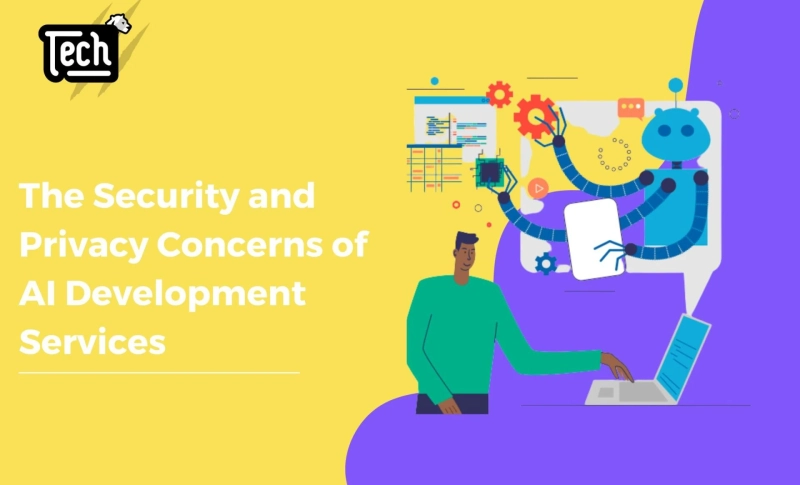Artificial intelligence (AI) has become a transformative technology in today's intense digital environment with the ability to disrupt industries and improve user experiences. As a result, the demand for AI solutions has grown significantly, leading to the rise of numerous AI development services providers and AI app development companies. While these services offer a plethora of opportunities, they also raise serious concerns regarding security and privacy. In this blog, we will delve into the intricate world of AI development services and examine the security and privacy challenges they present.
The Proliferation of AI Development Services Providers
As AI technologies become more accessible and affordable, businesses of all sizes are increasingly turning to AI development services providers to build custom solutions. AI app development companies are playing a pivotal role in bringing AI-powered applications to market. These providers offer a range of services, from developing chatbots and recommendation engines to building complex machine learning models for predictive analytics.
The appeal of these AI development services lies in their promise to deliver innovative and cost-effective solutions rapidly. However, this rapid proliferation of AI development services providers has also given rise to significant security and privacy concerns that need to be addressed.
Security Concerns in AI Development Services
Data Security: AI development heavily relies on data, and securing this data is paramount. AI service providers often have access to sensitive and proprietary data from their clients. The mishandling or breach of this data can result in significant financial and reputational damage. Companies must ensure that their data is protected through encryption, access controls, and regular security audits.
Model Vulnerabilities: AI models can be vulnerable to adversarial attacks, where malicious actors manipulate input data to deceive the model's predictions. This is a security concern, especially in critical applications like autonomous vehicles or healthcare AI, where incorrect decisions can have dire consequences. AI developers must continually assess and strengthen the robustness of their models against such attacks.
Code Vulnerabilities: Like any software, AI applications can contain security vulnerabilities in their code. Hackers can exploit these vulnerabilities to gain unauthorized access or disrupt the system. Regular code reviews, vulnerability assessments, and penetration testing are crucial to identifying and addressing these weaknesses.
Data Poisoning: In supervised machine learning, models learn from training data. If attackers manipulate this data by injecting poisoned samples, the model's behavior can be altered in unexpected and harmful ways. AI app development company must implement safeguards to detect and mitigate data poisoning attacks.
Privacy Concerns in AI Development Services
Data Privacy: AI development often requires access to large datasets, which may include personal and sensitive information. Ensuring that data is anonymized and that privacy regulations like GDPR and CCPA are adhered to is essential to protect individuals' privacy rights.
Ethical AI: AI models can perpetuate biases present in the training data, leading to unfair or discriminatory outcomes. AI app development companies must consider the ethical implications of their models and implement mechanisms to mitigate bias.
Informed Consent: When AI solutions involve user data, obtaining informed consent becomes crucial. Users must be aware of how their data will be used and have the option to opt out. AI development services providers should prioritize transparency in data handling.
Third-party Data Sharing: Many AI development projects involve sharing data or models with third parties. This introduces additional privacy risks, and companies must carefully evaluate and manage these partnerships to safeguard sensitive information.
Mitigating Security and Privacy Concerns in AI Development Services
To address the security and privacy concerns associated with AI development services, both providers and clients must take proactive measures:
Secure Development Practices: AI app development companies should adopt secure coding practices and implement security measures from the early stages of development. This includes regular code reviews, threat modeling, and vulnerability assessments.
Data Minimization: Collect and store only the data necessary for the AI model's functionality. This reduces the potential impact of data breaches and enhances privacy.
Encryption and Access Controls: Encrypt sensitive data both in transit and at rest. Implement strong access controls to ensure that only authorized personnel can access sensitive systems and data.
Privacy Impact Assessments: Conduct privacy impact assessments to identify and mitigate privacy risks associated with AI projects. Ensure compliance with relevant data protection regulations.
Bias Mitigation: Implement techniques such as fairness-aware machine learning to reduce bias in AI models. Regularly audit models for fairness and bias.
User Education: Educate users about data usage and privacy practices, providing clear information on how their data will be used and the option to opt out.
Third-party Due Diligence: Evaluate the security and privacy practices of third-party partners and vendors. Ensure they meet the same standards and adhere to data protection regulations.
Conclusion
As AI development services providers and AI app development companies continue to grow in number and influence, the security and privacy concerns surrounding AI development are becoming more pronounced. It is essential for businesses to recognize the potential risks and take proactive steps to mitigate them.
By adopting secure development practices, prioritizing data privacy, and being transparent with users, AI development services providers can build trust and deliver innovative AI solutions while safeguarding sensitive data and respecting individual privacy rights. Clients, on the other hand, must actively engage with providers, assess their security and privacy measures, and ensure that ethical considerations are woven into the fabric of AI development projects. In this way, we can harness the power of AI without compromising on security and privacy.



